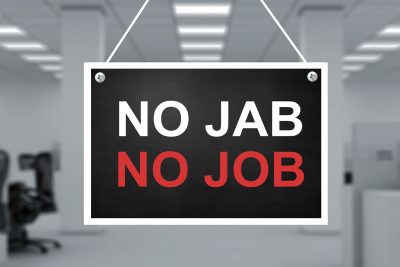
Employers will face challenges from staff over ‘no jab no job’ vaccine policies.
Following the removal of lockdown restrictions this time last month, many employers are struggling with the legal minefield surrounding vaccination policies in bringing staff safely back to the workplace.
When restrictions were lifted, the government left the onus on employers to carry out COVID-19 inclusive health and safety risk assessments, and take “reasonable steps” to mitigate risks to their employees.
As such, employers may have reasonably seen the implementation of a vaccine policy as such a reasonable step.
Or, looking to the Health and Safety at Work Act 1974, believed the act allowed them (as part of their responsibility for ensuring the health and safety of their employees) to demand COVID-19 vaccinations, or details of an employee’s vaccine status, before allowing them to return to the workplace.
Just weeks after the lifting of restrictions, Sky News reported that the government suggested companies who proposed checking the vaccination status of their staff “will need to consider how this fits with their legal obligations”.
As a seasoned employment law solicitor, I would caution employers to tread very carefully around this issue. Government messaging has not been clear cut in this area with some ministers seemingly contradicting advice and encouraging businesses to adopt a vaccination policy.
Already, we are seeing an increase in calls from worried employees who want to know their legal rights when it comes to either not wanting the vaccine, or more significantly being asked to return to a workplace where they believe colleagues won’t have been vaccinated.
An employer’s existing legal obligation to keep staff safe under both the Employment Rights Act 1996 and Health and Safety at Work Act 1974 means that staff who feel they are in ‘serious or imminent danger’ cannot be subjected to detrimental treatment for refusing to return to their workplace as a result.
A recent survey carried out by the Chartered Institute of Management found that nearly a quarter of business managers were only prepared to work with colleagues who had been double jabbed.
Making vaccination demands on their staff could reasonably leave an employer facing an Employment Tribunal claim. This could arise from a range of discrimination based disputes to an unfair dismissal claim, where non compliance has resulted in an employee being let go.
A broad brush approach by employers simply will not work. The law in this area is incredibly complex and employers need to take into account the wider legal protections afforded to their staff.
For example, under the Human Rights Act 1998 an employee who felt forced into taking the vaccine to keep their job, could argue this was a medical procedure, and as such, a potential breach of their human rights.
Similarly, where an employee felt harassed, by their boss or colleagues, for refusing the vaccine on the grounds of their religious beliefs they could seek protection under s.26 of the Equality Act 2010. Or, where an employer has failed to make reasonable adjustments for a member of staff who could not have a jab due to a disability, they could potentially advance a claim at Employment Tribunal under s.20 of the Equality Act 2010.
Unlike the growing ‘no jab no job’ mandatory vaccination policies being implemented by US firms, UK employers will need to look to a more ‘encouragement’ based approach to avoid falling foul of UK employment law. This is an approach echoed by the Advisory, Conciliation and Arbitration Service (ACAS) who are urging employers to support staff in receiving their vaccinations.
After some 16 months away, many employees will be looking forward to returning to their workplace.
Their employers must ensure any policies they adopt to enable their safe return, recognise the employment rights and protections they are afforded under UK law.
Tom is recognised as one of the UK’s leading Employment Law solicitor advocates. He is a straight talking, approachable lawyer who has a keen eye for what makes a viable case.
For nearly 20 years Tom has been upholding the legal rights and protections of employees and individuals, and since qualifying as a solicitor has been involved in a number of high profile landmark cases.
He is a seasoned litigator who specialises in contentious employment law, civil and commercial litigation, arbitration and dispute resolution.
In accordance with his strongly held objective to provide everyone who has a viable legal claim with an easy pathway to justice, Tom founded the online portals www.doihaveacase.co.uk (2010) and www.tribunalclaim.com (2015), both of which primarily aim to offer no win no fee representation.
2019 saw the creation of www.solicitornetwork.com whereby Tom established a nationwide community/network of solicitors with a shared philosophy to ‘deliver straight-talking advice and professional legal representation’ to individuals and businesses throughout the UK.
Tom Street is regulated by the Solicitors Regulation Authority (SRA) ID number: 566718.
For more information on Tom.

